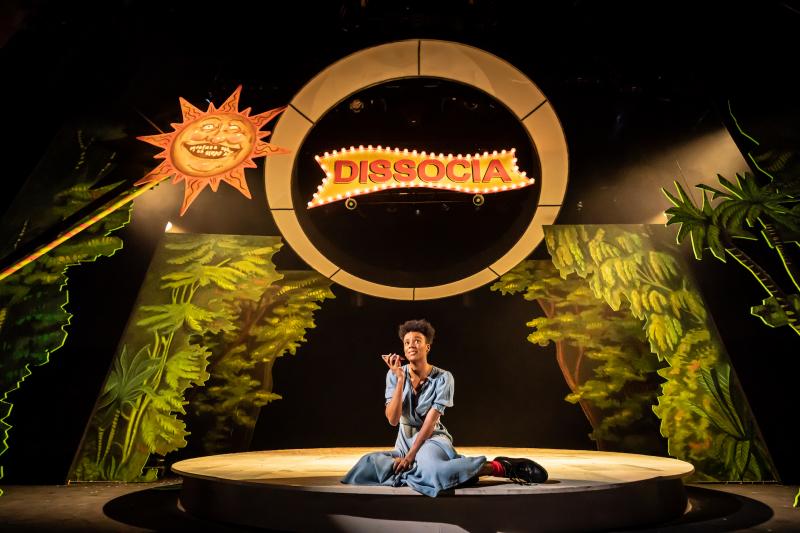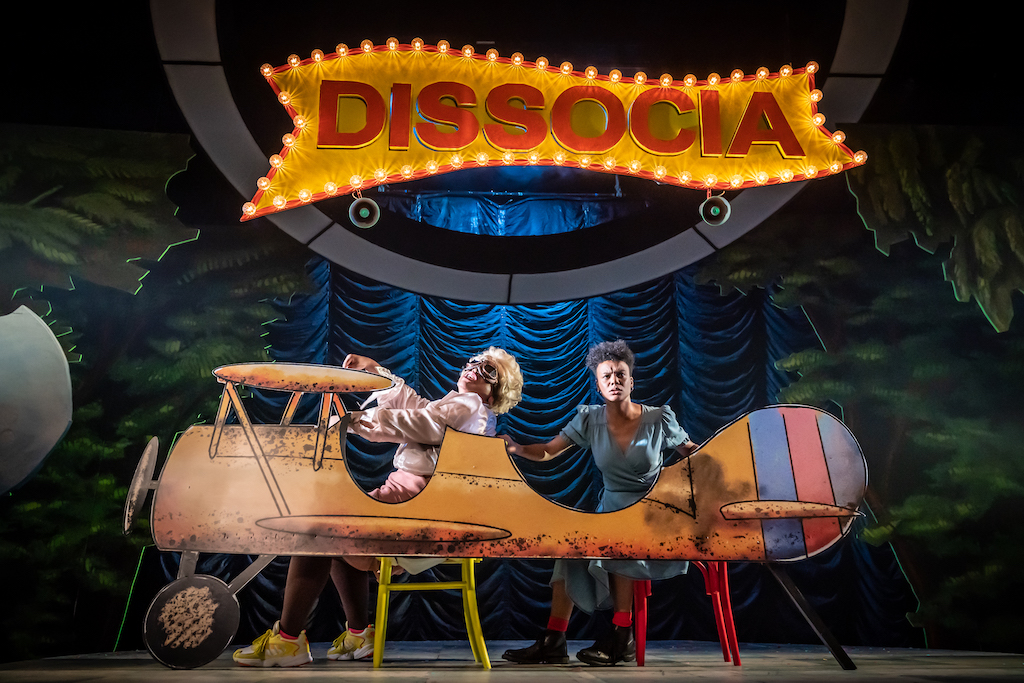The Wonderful World of Dissocia, Theatre Royal Stratford East review - wild trip gets a welcome revival | reviews, news & interviews
The Wonderful World of Dissocia, Theatre Royal Stratford East review - wild trip gets a welcome revival
The Wonderful World of Dissocia, Theatre Royal Stratford East review - wild trip gets a welcome revival
A woman confronts her neuroses in a phantasmagorical world full of fun and fear

Lisa has lost an hour in a (somewhat contrived) temporal glitch. As a consequence, her world is always sliding off-kilter, not quite making sense, things floating in and out of memory. A watchmaker (himself somewhat loosely tethered to reality) tells her that she needs to get it back as a lost hour wields great power and can fall into the wrong hands. Lisa embraces her quest and travels to the strange land of Dissocia.
It’s a convoluted framing device, but it gets Anthony Neilson to where he wants to go in his cult hit of 2004, given a timely revival by Emma Baggott at the Theatre Royal Stratford East. Mental health has become much more prominent in public discourse in the 18 years since the play premiered, but the word used is almost always "awareness" and not "understanding" – two hours in the company of Lisa goes some way towards telling us why that is so.
Once in Dissocia, which has something of the surreal attraction underpinned by malevolence that characterises Mr Wonka’s chocolate factory, Lisa encounters friends and foes or, rather, friends who can turn into foes and foes who can turn into friends. No one can be trusted, but someone has to be and, truth be told, they’re useful to have around when the armies of the Black Dog launch their attacks. If the Insecurity Guards in Dissocia’s arrivals hall didn’t tip you the wink, then that existential enemy’s name certainly would. We’re inside Lisa’s mind, in the hall of mirrors that dissociative disorders erect to stave off depression – at least, I think that’s how it works. Depression’s black dog is fiendishly difficult to pin down if you’re fortunate enough never to hear its barking.
If the Insecurity Guards in Dissocia’s arrivals hall didn’t tip you the wink, then that existential enemy’s name certainly would. We’re inside Lisa’s mind, in the hall of mirrors that dissociative disorders erect to stave off depression – at least, I think that’s how it works. Depression’s black dog is fiendishly difficult to pin down if you’re fortunate enough never to hear its barking.
Soon, Lisa meets other bizarre creatures, each having characteristics of neuroses, each comforting and helping her, but also irritating and obstructing her. She oscillates between exasperation and acceptance of their chaotic disturbances in a land that she knows cannot be real, but it’s the only one she has. She needs her hour back to rebalance her life. And then everything changes...
Leah Harvey (pictured above with Dominique Hamilton) is excellent as Lisa, centring her comic and distressing encounters in Dissocia in a fundamental decency that slides only when she is presented with symbols of childhood – a giant teddy bear that sings a lullaby with the portentous title of “Who’ll Hold Your Paw When You Die?” and when she goes carpet bombing women and children leaving scorched earth patterns in the shapes of fluffy animals (there’s a Catch 22 reference there for sure). Something in her childhood has been triggered in Dissocia, but she can’t find it.
The rest of the cast rotate through a wild menagerie of characters. Archie Backhouse lends a sullen teenage amorality to his goat who desires to be blamed; Phoebe Naughton gives her Australian Hot Dog Stand / Lost Property Office manager exactly the right level of passive aggression to stop her customers getting to what they need to resolve their problems; and Dominique Hamilton is perhaps the scariest and most disturbing of all as a council worker employed to take on the responsibility and pain of being the victim of heinous crimes. More crimes but fewer victims, see?
Grace Smart does a fine job in creating this unbelievable, unreal but very much present world, with a pantomime-ish set that reminds us of the childhood anxieties related to fear and fun that course through the narrative. Her best feature is the halo-like light that shines so unforgivingly down on Lisa in Act Two, its flashes marking the entrance of another medical professional, its jarring a jolt to our senses as much as Lisa's.
Away from Dissocia, we see a shadow of the person whom we’ve come to know, her agency limited by drugs and the bureaucratic routines of uninterested doctors and nurses. We feel the seductive pull of Dissocia, for all its horrors, a conclusion that was easier to accept when first I saw this play 12 years or so ago. That’s why it’s a timely revival.
rating
Share this article
The future of Arts Journalism
You can stop theartsdesk.com closing!
We urgently need financing to survive. Our fundraising drive has thus far raised £49,000 but we need to reach £100,000 or we will be forced to close. Please contribute here: https://gofund.me/c3f6033d
And if you can forward this information to anyone who might assist, we’d be grateful.

Subscribe to theartsdesk.com
Thank you for continuing to read our work on theartsdesk.com. For unlimited access to every article in its entirety, including our archive of more than 15,000 pieces, we're asking for £5 per month or £40 per year. We feel it's a very good deal, and hope you do too.
To take a subscription now simply click here.
And if you're looking for that extra gift for a friend or family member, why not treat them to a theartsdesk.com gift subscription?
more Theatre
 Othello, Theatre Royal, Haymarket review - a surprising mix of stateliness and ironic humour
David Harewood and Toby Jones at odds
Othello, Theatre Royal, Haymarket review - a surprising mix of stateliness and ironic humour
David Harewood and Toby Jones at odds
 Macbeth, RSC, Stratford review - Glaswegian gangs and ghoulies prove gripping
Sam Heughan's Macbeth cannot quite find a home in a mobster pub
Macbeth, RSC, Stratford review - Glaswegian gangs and ghoulies prove gripping
Sam Heughan's Macbeth cannot quite find a home in a mobster pub
 The Line of Beauty, Almeida Theatre review - the 80s revisited in theatrically ravishing form
Alan Hollinghurst novel is cunningly filleted, very finely acted
The Line of Beauty, Almeida Theatre review - the 80s revisited in theatrically ravishing form
Alan Hollinghurst novel is cunningly filleted, very finely acted
 Wendy & Peter Pan, Barbican Theatre review - mixed bag of panto and comic play, turned up to 11
The RSC adaptation is aimed at children, though all will thrill to its spectacle
Wendy & Peter Pan, Barbican Theatre review - mixed bag of panto and comic play, turned up to 11
The RSC adaptation is aimed at children, though all will thrill to its spectacle
 Hedda, Orange Tree Theatre review - a monument reimagined, perhaps even improved
Scandinavian masterpiece transplanted into a London reeling from the ravages of war
Hedda, Orange Tree Theatre review - a monument reimagined, perhaps even improved
Scandinavian masterpiece transplanted into a London reeling from the ravages of war
 The Assembled Parties, Hampstead review - a rarity, a well-made play delivered straight
Witty but poignant tribute to the strength of family ties as all around disintegrates
The Assembled Parties, Hampstead review - a rarity, a well-made play delivered straight
Witty but poignant tribute to the strength of family ties as all around disintegrates
 Mary Page Marlowe, Old Vic review - a starry portrait of a splintered life
Tracy Letts's Off Broadway play makes a shimmeringly powerful London debut
Mary Page Marlowe, Old Vic review - a starry portrait of a splintered life
Tracy Letts's Off Broadway play makes a shimmeringly powerful London debut
 Little Brother, Soho Theatre review - light, bright but emotionally true
This Verity Bargate Award-winning dramedy is entertaining as well as thought provoking
Little Brother, Soho Theatre review - light, bright but emotionally true
This Verity Bargate Award-winning dramedy is entertaining as well as thought provoking
 The Unbelievers, Royal Court Theatre - grimly compelling, powerfully performed
Nick Payne's new play is amongst his best
The Unbelievers, Royal Court Theatre - grimly compelling, powerfully performed
Nick Payne's new play is amongst his best
 The Maids, Donmar Warehouse review - vibrant cast lost in a spectacular-looking fever dream
Kip Williams revises Genet, with little gained in the update except eye-popping visuals
The Maids, Donmar Warehouse review - vibrant cast lost in a spectacular-looking fever dream
Kip Williams revises Genet, with little gained in the update except eye-popping visuals
 Ragdoll, Jermyn Street Theatre review - compelling and emotionally truthful
Katherine Moar returns with a Patty Hearst-inspired follow up to her debut hit 'Farm Hall'
Ragdoll, Jermyn Street Theatre review - compelling and emotionally truthful
Katherine Moar returns with a Patty Hearst-inspired follow up to her debut hit 'Farm Hall'
 Troilus and Cressida, Globe Theatre review - a 'problem play' with added problems
Raucous and carnivalesque, but also ugly and incomprehensible
Troilus and Cressida, Globe Theatre review - a 'problem play' with added problems
Raucous and carnivalesque, but also ugly and incomprehensible

Add comment